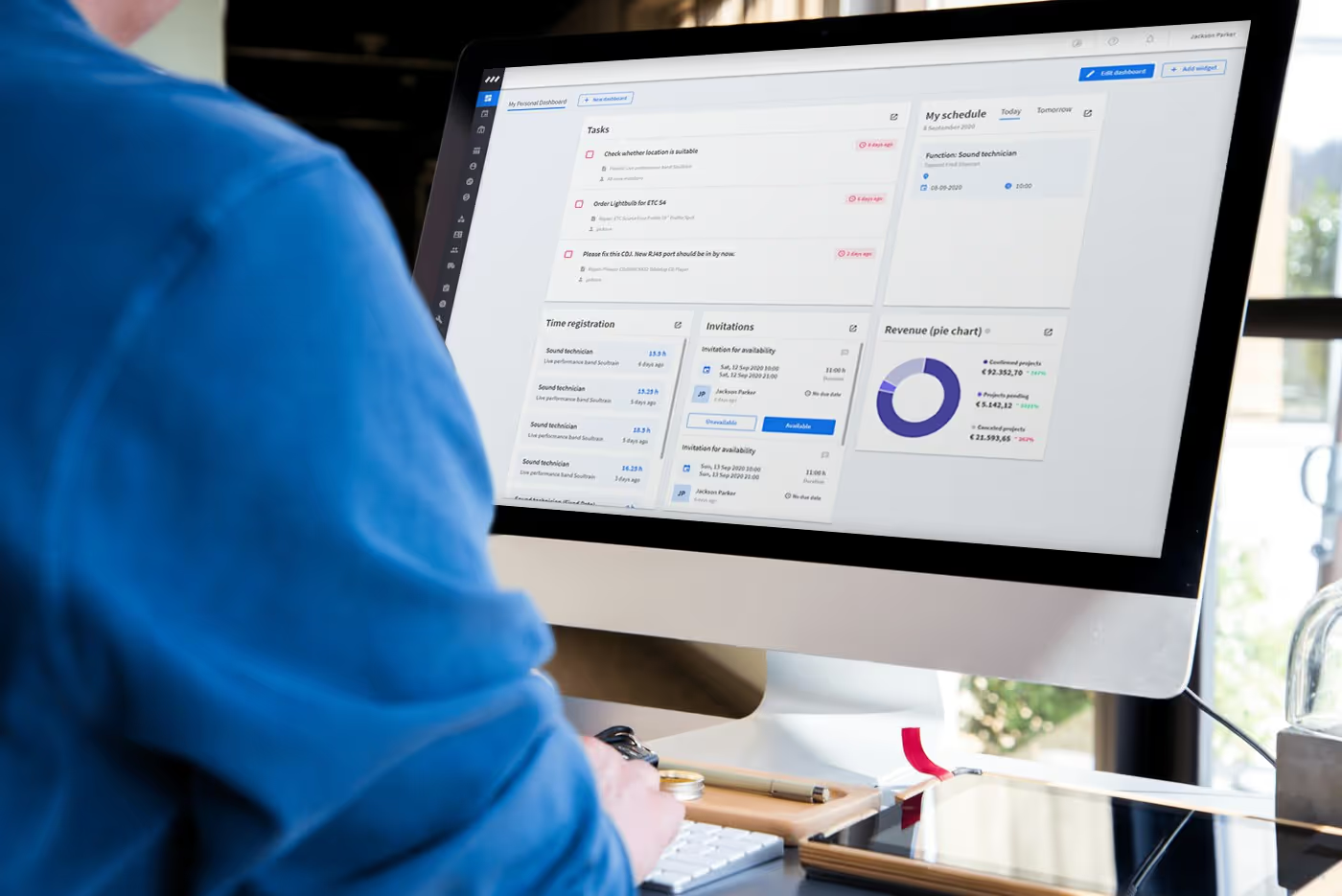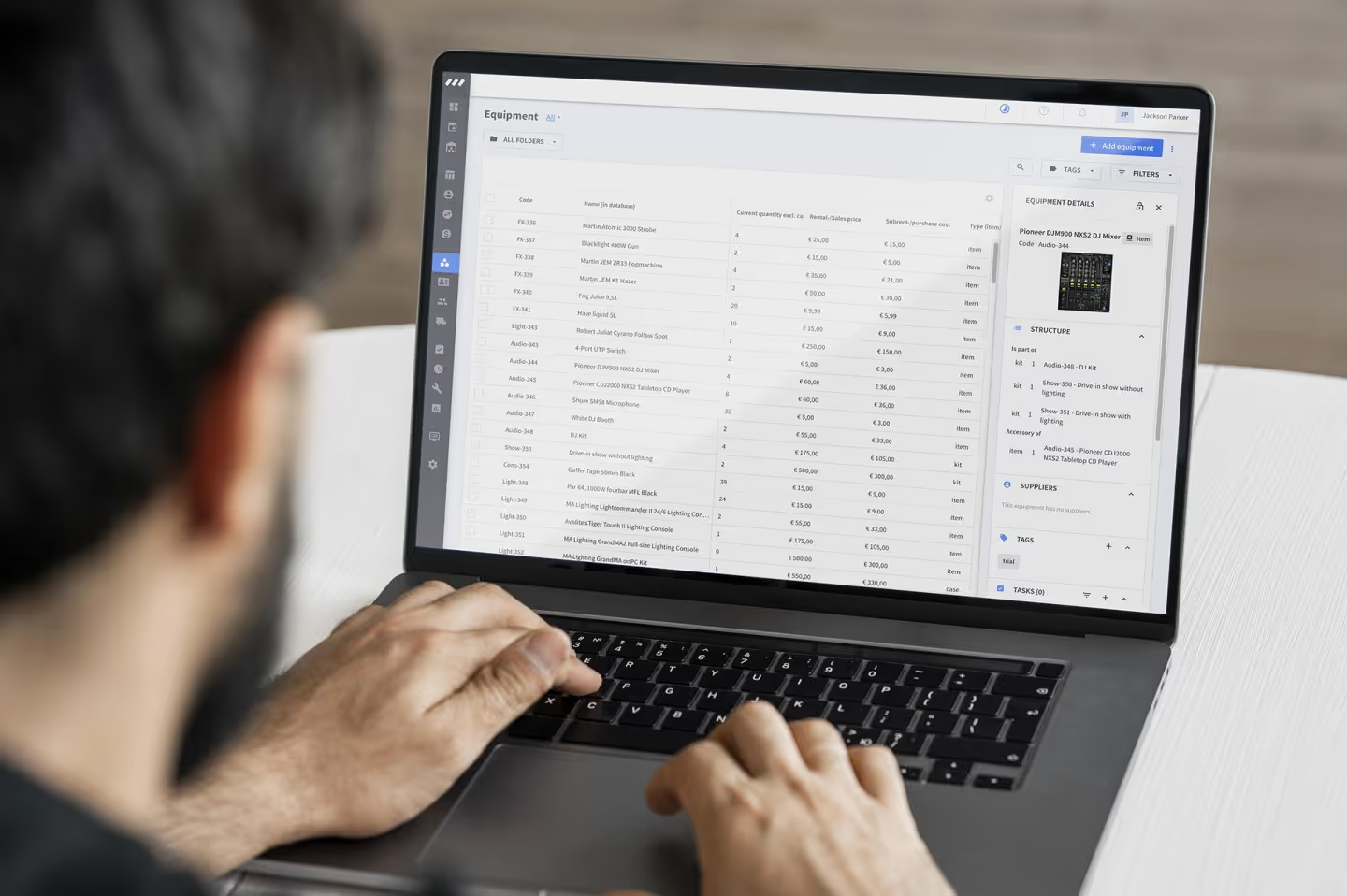The Ultimate Guide to Choosing the Right Rental Company Software for Your Event Business

Choosing the right rental company software is critical for the success and efficiency of your event business. With a myriad of options available in the market, selecting the most suitable rental software can seem daunting. This guide aims to simplify the decision-making process by breaking down key considerations and features to look for.
From user-friendly interfaces to robust reporting capabilities, we will cover everything you need to know to make an informed choice. Let's dive into the essentials of rental company software that can streamline your operations, increase productivity and boost your bottom line.
1. Understanding Rental Company Software
2. Evaluating Your Business Needs
3. Implementing Your Chosen Software
4. Long-term Maintenance and Support
Understanding Rental Company Software
Key Features to Look For
When searching for the right rental company software, certain features stand out as essential. First, consider ease of use. A user-friendly interface ensures that your team can quickly adapt and integrate the software into their daily routines. Next, focus on inventory management. Effective inventory management software should provide real-time asset tracking, and notifications to prevent double bookings and ensure availability of equipment for events.
Additionally, robust reporting capabilities are crucial. Look for software that offers customizable reports to help you analyze event trends, track equipment usage, and make informed business decisions. Integration capabilities are also important. Software that can seamlessly work with your existing tools, such as event planning software or accounting systems, will streamline your operations. Lastly, consider scalability. As your event business grows, your software should be able to expand and adapt to increased demands without losing performance. By prioritizing these features, you can select rental company software that optimizes efficiency and supports your business's success.
Benefits of Using Specialized Software
Using specialized rental company software offers several benefits that can significantly enhance your event business operations. Firstly, it streamlines administrative tasks. Automation of processes like invoicing and scheduling reduces manual effort and minimizes errors, saving time and resources for your event planning team.
Secondly, it enhances customer service. With features like automated reminders and online booking portals, you can provide a seamless experience for your clients, leading to higher satisfaction and loyalty. Another advantage of customizable rental management software is improved inventory management. Specialized software provides real-time updates on equipment availability, helping you avoid overbooking and ensure optimal service for your events.
Additionally, it facilitates better financial tracking. Detailed reporting and analytics enable you to monitor expenses, revenue, and profitability, empowering you to make strategic decisions for your event business. Lastly, specialized rental companies software supports scalability. As your event business grows, the software can handle increased volume and complexity, ensuring consistent performance. By leveraging these benefits, rental company software can become a vital tool in driving your event business forward.
Common Challenges and Solutions
Implementing rental company software can come with its own set of challenges. One common issue is the resistance to change from staff. To address this, invest in comprehensive training sessions that demonstrate the software's benefits and ease of use in the context of event planning. Another challenge is data migration. Transitioning from old systems to new software can be complex. Mitigate this by working with a provider that offers support during the migration process to ensure data integrity.
Additionally, some rental businesses may face integration problems with existing event planning tools. Choose software that has robust API capabilities to facilitate seamless integration. Security concerns are also prevalent. Protect your data by selecting software with strong security features, such as encryption and regular backups. Lastly, the initial cost can be a hurdle. While the upfront investment might be significant, focus on the long-term gains in efficiency, increased productivity, and improved profitability to justify the expense. By proactively addressing these challenges, you can ensure a smoother implementation of your rental company software.
Evaluating Your Business Needs
Analyzing Current Operations
Before selecting rental company software, it's crucial to analyze your current event business operations. Start by identifying pain points in your existing processes. Are you facing issues with equipment inventory tracking, customer management, or financial reporting for your events? Understanding these challenges will help you prioritize the features you need. Next, evaluate the efficiency of your event workflows. Are there repetitive tasks that could be automated? Look at how data flows through your system to pinpoint bottlenecks.
Additionally, gather feedback from your event planning team. They can provide insights into what's working well and what needs improvement. Assess your current software tools and their limitations. Determine if they lack integration capabilities or if they're simply outdated. Finally, consider your future goals. Are you planning to expand your inventory or offer new types of events? Knowing your growth plans will help you choose customizable event equipment rental management software that can scale with your business. By thoroughly analyzing your current operations, you can make a more informed decision when selecting rental company software.
Defining Essential Software Capabilities
Defining essential capabilities for your rental company software is a critical step in meeting your event business needs. Start by listing the core functions your business relies on daily. For instance, if managing a large inventory of event equipment is crucial, look for software with advanced tracking and forecasting features.
Customer management is another key area. The software should enable seamless communication, booking, and service history tracking for your events. Financial management capabilities are also essential for event equipment rental software too. Opt for a system that offers detailed analytics with invoicing, payment processing, and expense tracking. Furthermore, ensure the software can integrate with existing tools like event planning software or accounting software to maintain workflow consistency.
Consider the importance of scalability. Your software should be able to grow with your event business, handling increased data and user load efficiently. By clearly defining these essential capabilities, you can narrow down your options and choose software that aligns perfectly with your operational requirements and long-term objectives.
Considering Future Growth
When evaluating rental company software, it's vital to consider your event business's future growth. Begin by assessing your expansion plans. Are you looking to increase your inventory of event equipment, diversify your offerings, or enter new markets? The next rental equipment management software you choose should be capable of supporting these ambitions without requiring a complete overhaul. Look for solutions that offer scalable features and flexible pricing models, allowing you to add users or features as your event business grows.
Additionally, consider whether the software can handle increased data volumes and maintain performance during peak event times. Long-term support and regular updates are also crucial. Choose a provider committed to evolving their software to meet changing industry standards and technological advancements. Furthermore, ensure that the software has robust integration capabilities, which will be essential as you incorporate more tools and systems into your event operations. By planning for future growth, you ensure that your investment in rental company software will continue to deliver value as your event business evolves.
Implementing Your Chosen Software
Training Your Team Effectively
Effective training is essential for a smooth transition to new rental company software. Start by developing a structured training plan that covers all software features relevant to your team's roles in event planning. Use a mix of training methods, including hands-on workshops, video tutorials, and written manuals, to cater to different learning preferences.
Identify key team members to act as software champions; they can provide ongoing support and reinforce learning among peers. Encourage a culture of continuous learning by scheduling regular refresher sessions and updates whenever new features are introduced. Make use of vendor-provided resources like webinars, customer support, and community forums to enhance training sessions.
Additionally, collect feedback from your team to identify areas where additional training, maintenance management or support might be needed. By investing time and resources in comprehensive training, you ensure that your team is confident and capable in utilizing the software, leading to enhanced productivity and operational efficiency in your event business.
Ensuring Smooth Software Integration
Ensuring smooth integration of your chosen rental company software with existing systems is crucial for uninterrupted event operations. Begin by conducting a thorough compatibility check to identify potential conflicts with current tools, such as event planning software or accounting software. Collaborate with your IT team or software provider to develop an integration plan that outlines each step of the process. Use APIs (Application Programming Interfaces) to facilitate seamless data exchange between platforms.
Test the integration in a controlled environment before fully deploying it, allowing you to address any issues without disrupting daily event operations. Keep a backup of all critical data to prevent loss during the transition. Provide your team with guidance on how to use the integrated system effectively, emphasizing the benefits of streamlined workflows in event planning. Regularly monitor the integration's performance and make necessary adjustments to optimize functionality. By taking these steps, you ensure a smooth rental software integration, enhancing overall efficiency and productivity in your event business.
Measuring Success and ROI
Measuring the success and return on investment (ROI) of your rental company software involves tracking key performance indicators (KPIs) that align with your event business goals. Start by identifying metrics like time saved on manual tasks, reduction in booking errors, and improvements in customer satisfaction for your events. Use the rental business software's reporting tools to gather quantitative data on these metrics over time. Compare these findings against the baseline data collected before implementation to assess tangible benefits.
Additionally, calculate the financial ROI by evaluating increased revenue from improved efficiency and reduced costs related to administrative errors in event planning. Seek qualitative feedback from your team to gain insights into user experience and overall satisfaction with the new system. Regularly review these findings and make necessary adjustments to maximize the rental process software's benefits. By systematically measuring success and ROI, you can ensure that your investment in rental company software is delivering the expected value and contributing to your event business's long-term growth.
Long-term Maintenance and Support
Regular Software Updates
Regular software updates are vital for maintaining the efficiency and security of your rental company software. These updates often include patches that fix bugs, enhance security protocols, and introduce new features that keep your system up-to-date with industry standards.
Schedule routine checks to ensure that your rental operations software is running the latest version recommended by the provider. Automate updates where possible to minimize disruption to your operations. Educate your team on the importance of these updates and how they help in preventing vulnerabilities that could compromise data integrity. Keep an eye on release notes from the software provider to understand what each update entails and how it might impact your workflow.
Regularly reviewing the need for updates ensures that you leverage all the enhancements offered, boosting productivity and maintaining a secure environment. By prioritizing regular software updates, you safeguard your investment and ensure that your rental company software remains a valuable asset for your business.
Accessing Technical Support
Accessing reliable technical support is crucial for the seamless operation of your rental company software. Start by familiarizing yourself with the support options provided by your rental management software and vendor, such as email, phone, and live chat assistance. It's beneficial to choose a provider that offers 24/7 support, ensuring help is available whenever you encounter issues with equipment rental businesses, regardless of time zones.
Maintain a record of past issues and resolutions to aid in quicker troubleshooting for recurring problems. Participate in user forums and communities to gain insights and solutions from other users who might have faced similar challenges. Establish a point of contact within your team responsible for liaising with tech support, streamlining communication and ensuring consistency in problem-solving. Regularly review the support quality and response times to ensure you’re receiving the level of service promised. By effectively accessing technical support, you can minimize downtime and maintain the reliability of your rental company software.
Adapting to Industry Changes
Adapting to industry changes is essential for staying competitive and ensuring your rental company software continues to meet evolving business needs. Start by staying informed about trends and advancements in your industry through trade publications, webinars, online bookings, and industry conferences. Regularly review your software’s features and capabilities to ensure they align with new rental industry standards and customer expectations.
Engage with your software provider to understand how their updates and new features can help you adapt to these changes. Be proactive in seeking feedback from your team and customers about emerging needs and challenges, using this information to guide software customization and integration efforts. Consider scalability and flexibility as core criteria when evaluating software updates and new tools.
By continuously adapting to industry changes, you ensure that your rental company software remains a robust and effective tool, supporting your business's growth and responsiveness in a dynamic market.
Frequently asked questions
Previous blog posts

The Ultimate Guide to Choosing the Best Rental Business Software for the Event Industry
The Ultimate Guide to Choosing the Best Rental Business Software for the Event Industry

Mastering Equipment Rental KPIs: A Complete Guide for Success in the Event Industry
Mastering Equipment Rental KPIs: A Complete Guide for Success in the Event Industry

